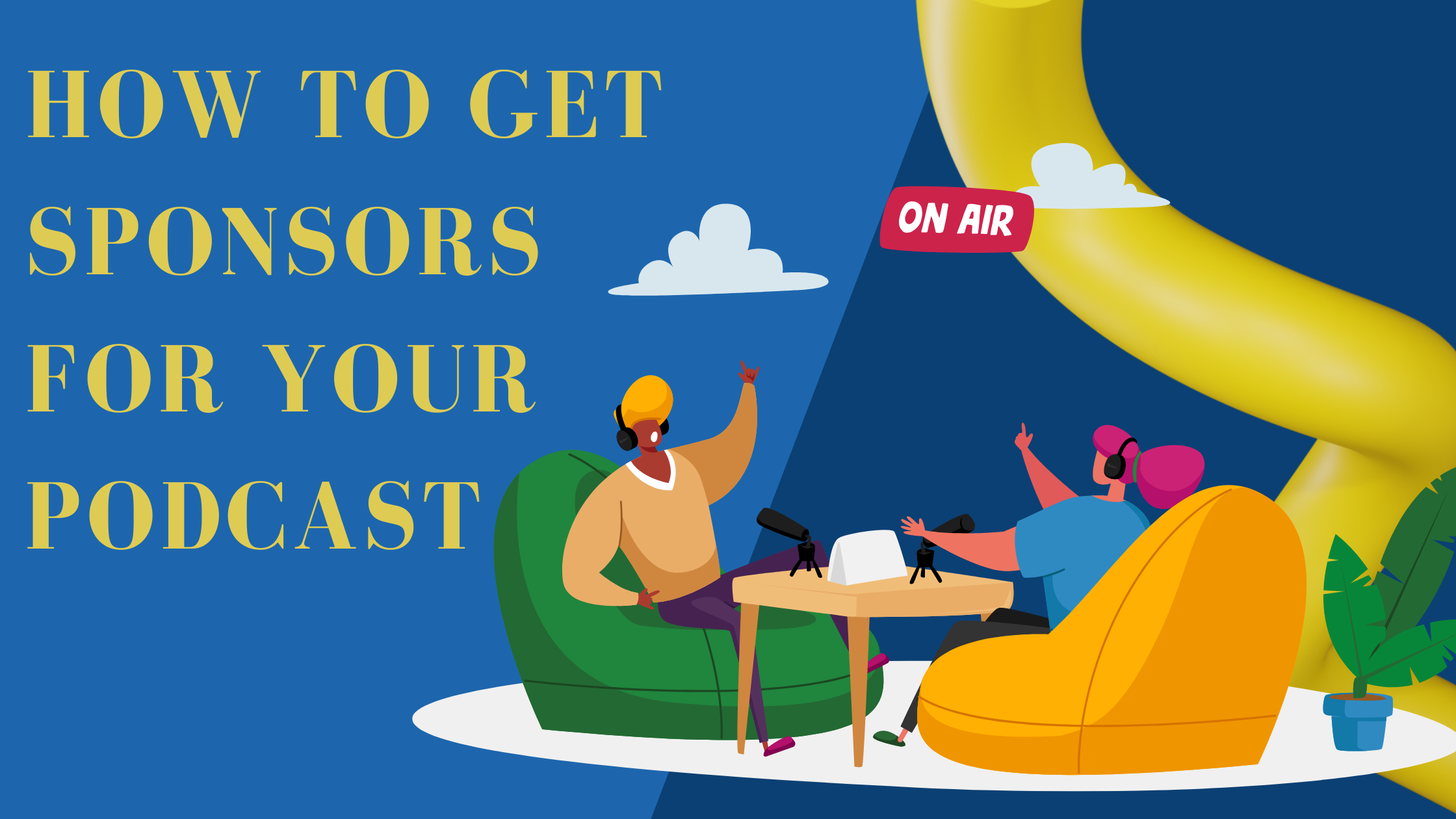
In today’s world of podcasting, your voice has the incredible ability to connect with listeners worldwide. As a podcaster, you might aim to explore ways to make money from your podcast, and one excellent avenue is through securing sponsors. This article will delve into the art of podcast sponsorship, providing a step-by-step guide on finding sponsors for your podcast episode and effectively pitching your show to potential advertisers. Whether you’re a seasoned podcaster or just starting out, learning how to attract podcast sponsors can enhance your content creation journey and open up opportunities to get paid for your passion. From grasping the ins and outs of podcast advertising to exploring specific markets, we’ll steer you toward successfully monetizing your podcast, turning each episode into a potential source of income. So, let’s jump in and explore various strategies, such as mid-roll ads, affiliate partnerships, and joining podcast networks, to help you find sponsors and elevate your podcast to new heights.
TYPES OF PODCAST SPONSORSHIP MODELS TO GET PAID
Before you seal the deal with your desired brand, it’s crucial to understand the benefits you stand to gain. Here are the three key metrics commonly used in podcast advertising:
● CPM Model (Cost Per Mille)
CPM, or “cost per mille,” refers to the amount advertisers pay podcasters for every 1000 listens their ad receives. Typically, CPM rates for most podcasts fall within the $20-$25 range. For instance, if your podcast garners 5,000 downloads per episode, you could earn $100-$125. While this model proves lucrative, it is most effective for podcasts boasting 10,000 or more listeners, making it less suitable for many independent podcasters.
● Affiliate Model (CPA – Cost Per Acquisition)
In the Affiliate model, podcasters receive compensation for each sale generated through an affiliate link. This is particularly advantageous for independent and new podcasters. The affiliate model thrives with smaller, engaged audiences as well as larger podcasts. Podcasters with a dedicated following can make the most of this model.
● Value-Based Model
In the Value-Based model, advertisers pay podcasters a fixed rate for promoting their product or service. This model is ideal for podcasters with a highly engaged audience. For instance, if your podcast is listened to by 200 people, you might secure $500 for a single product mention. The key here lies in providing value to the brands. Even if your listener base is relatively small, if it consists of the right audience, brands will take notice. The emphasis is on quality over quantity, demonstrating that engaged listeners can be just as impactful as larger numbers.
ADVANTAGES OF GETTING SPONSORED

Wondering if getting sponsors for your first podcast is a big deal? Spoiler alert: it is, and here’s why! Podcast sponsors bring a slew of benefits, with some standouts:
● Monetize Your Show
Imagine turning your passion into a money-making venture. Podcast sponsors make it happen. By learning how to get podcast sponsorships, you not only indulge in your hobby but also earn simultaneously. Picture this – more than two-thirds of podcast listeners take action based on the ads they hear, and sponsors will pay you for it. That’s a significant number! Every time your podcast listeners act on the ads, you’re putting some extra cash in your pocket.
● Building Your Brand Identity
In a sea of 850,000 podcasts, standing out is crucial for any type of podcast. Podcast sponsors help you create a strong brand identity, attracting the attention of your podcast listeners. A whopping three-quarters of Americans listen to podcasts to learn new things. By providing quality podcast content, you’re not just entertaining; you’re building a brand that podcast listeners will remember.
● Building a Network
The relationship with your first podcast sponsor goes beyond ads. By reaching out to potential sponsors and promoting their goods and services, you’re building trust. This trust can open doors to further business and networking opportunities, especially for those trying to join the podcast community. It’s a two-way street where both the host and the sponsor benefit.
● Grow Your Platform
Captivating ads can turn one-time podcast listeners into loyal fans. If your audience enjoys the podcast content and ads, they’ll keep coming back and bring their friends along. Over time, strategic podcast sponsors become catalysts for increased traffic, helping your audience and podcast platform grow. While sponsorships aren’t the only way to monetize your podcast, they’re an excellent starting point. So, in the grand scheme of things, learning how to get podcast sponsors isn’t just a big deal – it’s a game-changer for your podcasting journey and a crucial step for those eager to get sponsors for their podcast hosting platform.
HOW DOES A PODCAST SPONSORSHIP DEAL WORK?
Get Sponsors For My Podcast
Types of Ads
When you’re looking for sponsors for your podcast, it’s important to understand how ads work. Sponsors pay you to talk about their products or services in your episodes. There are two main ways to do this: radio-style or host-read.
- Radio-Style Ads
In this style, a company creates and places ads in your episodes. These ads can be really effective, with 7 out of 10 listeners thinking about trying a product they heard about on a podcast.
- Host-Read Ads
With this type, you talk about the product or service and explain why it works for you. This is the more popular choice, making up 63% of podcast ads. You have the freedom to share your thoughts naturally. You can place these ads at the beginning (pre-roll), middle (mid-roll), or end (post-roll) of your episode.
Choosing a Sponsorship Model
After deciding on the ad type, you need to pick a sponsorship model: CPM, affiliate, or value-based. Each model has its own benefits, and your choice should match the value of your podcast.
QUESTIONS TO ASK BEFORE REACHING OUT TO A SPONSOR

Before diving into the realm of podcast sponsorships, understanding the intricacies is crucial, especially in the early stages of your great podcast. Any experienced advertiser will have questions, and having well-prepared answers is key to securing sponsors for your show. Here are essential questions sponsors might ask:
- What is Your Pitch?
- Why should a brand invest in advertising with your podcast?
- Utilize a media kit to address common questions and promote the idea of podcast marketing.
- Craft a compelling podcast trailer tailored for advertisers to introduce your podcast effectively.
-
What is the Demographics of Your Audience?
- Define your audience, whether it includes stay-at-home dads, college-going basketball enthusiasts in Chicago, high-earning single women, or teenagers.
- Leverage podcast analytics, especially from platforms like Spotify, for detailed demographics to better understand your audience.
-
What is Your Advertising Rate?
- Determine a fair advertising rate, calculated as CPM (cost per mille), based on your audience size and demographics.
- Emphasize the value of your show in the podcast advertising landscape, ensuring sponsors understand the business opportunity.
-
What is in Your Inventory?
- Break down your podcast ads into pre-roll, mid-roll, and post-roll ads, with mid-rolls often considered the most valuable.
- Explore native advertising, integrating a sponsor’s brand with your content, potentially through host-read ads or interview episodes with sponsor founders.
As you navigate the podcast sponsorship landscape, consider various ways to find podcast sponsors, including joining a podcast network and actively participating in podcast communities. Finding potential sponsors within your niche is critical for attracting multiple sponsors for your show. In the early stages of your podcast, strategically approach sponsors and explore different types of podcast sponsorship models, whether you’re a new podcast or a seasoned creator, podcast sponsorships are indeed a powerful means to monetize your podcast successfully.
HOW TO FIND THE RIGHT SPONSORS FOR YOUR PODCAST?

In the early stages of your podcasting journey, especially as an amateur, actively seeking sponsors is crucial. As your podcast gains popularity and cultivates a stable audience, sponsors may naturally come to you, providing a significant advantage. To secure the advertisers you dream of, follow these steps:
STEP 1 – Delve into Your Niche
A pivotal aspect of attracting advertisers for your podcast is finding sponsors aligned with your niche. Aligning ads with your podcast’s content is essential to avoid disappointing and frustrating your viewers. Tailoring ads to your audience enhances sponsor performance, allowing you to gradually increase rates as interest persists.
Begin by contemplating your ideal listener, often referred to as an ‘avatar’ or ‘persona’ in marketing terms. Understand their likes, dislikes, preferences, problems, and needs. Crafting multiple personas may be necessary to represent different listener groups. Regularly update the persona document based on evolving information.
STEP 2 – Seek Out Potential Sponsors
Now armed with knowledge about your audience, their preferences, and dislikes, it’s time to identify potential sponsors matching your audience and preferences. Explore various avenues to discover sponsors:
- Browse ads on websites and blogs
- Investigate companies advertising in industry magazines
- Review businesses running paid ads
- Monitor brand representatives in your online community
- Seek input from your listeners on preferred products
An effective way to find sponsors is by researching similar podcasts in your niche and approaching the companies sponsoring them. This approach allows you to tap into companies already investing in reaching your target audience.
Five Additional Tips for Finding the Right Sponsor
Navigating the sponsor discovery process involves trial and error. Utilize the following tips to secure your first deal:
-
Don’t Overlook Smaller Companies
- Your initial sponsor need not always be a big company that everyone knows. There are many small companies desperately looking for advertising opportunities too! Your listeners might even appreciate you for making them aware of lesser-known companies that sell great products.
-
Balance Price Considerations
- While wanting to earn from the ads is natural, prioritize sponsors aligned with your audience for increased engagement. Sacrificing a few dollars is better to ensure your listeners enjoy your podcast.
-
Choose Engaging Sponsors
- Ensure you are genuinely excited about the sponsor’s product. If you lack interest, there’s a risk of boring your audience.
-
Align with Respected Companies
- Only endorse products you genuinely approve of to maintain authenticity. Request samples for unfamiliar products before promoting them on your podcast.
-
Maintain an Open Mind
- Finding sponsors varies, with some having clear programs and others being flexible. Pitch potential sponsors who haven’t sponsored before and explore unconventional avenues.
STEP 3 – Craft Your Sponsorship Proposal
Impress potential sponsors with a well-crafted proposal that reflects your personality and professionalism. Your proposal should include:
- Title and logo of your podcast
- Niche summary, including episode details and popular guests
- Information about you, co-hosts, and the production team
- Audience demographics and evidence of audience engagement
- Proposed rates and partnership ideas, highlighting openness to suggestions
- Contact information
Create a template for your proposal deck, customizing it for each potential sponsor with specific language and imagery that resonates with their brand.
STEP 4 – Present Your Pitch
Once your proposal is polished, send it to potential sponsors via email. Craft a quality email that summarizes key points from your presentation and introduces your hosting style. Highlight notable guests and articulate why sponsoring your show is beneficial for them.
Furthermore, consider utilizing the services of a professional pitch deck design agency to create visually compelling and persuasive materials that further elevate your proposal.
STEP 5 – Follow Up Effectively
Patience is crucial when awaiting sponsor responses. If there’s no immediate reply, send a follow-up email after seven days, politely requesting a response, even if it’s a decline. Express gratitude for their time and convey openness to future collaborations. Maintain professionalism and an optimistic tone throughout your follow-up communications.
This process involves trial and error, but by following these steps, you can improve your chances of securing the right sponsors for your high-quality podcast. Remember, sponsors will want value from advertising on your podcast, so get creative, appeal to sponsors, and showcase how sponsorships pay off for both parties.
COMMONLY ASKED QUESTIONS ABOUT PITCHING A SPONSOR
Curious about how to grab a sponsorship deal and get sponsors to pay attention to your podcast? Well, here are some commonly asked questions about pitching a sponsor.
HOW TO GET PODCAST SPONSORS?
First things first, how do you even get sponsors? Look for independent creators and small businesses who might be interested. Your podcast doesn’t have to be super famous; even if it’s a new creation, you can still land a deal.
Maximize Listener Reach with Pre-Roll Ads
Wondering how sponsors listen to your podcast? Sponsors pay attention to your podcast’s reach, and a pre-roll ad can catch their eye.
UTILIZING APPLE PODCASTS AND OTHER PLATFORMS TO GET SPONSORS
Creating a podcast on platforms like Apple Podcasts opens up various ways to get noticed.
NAVIGATING THE PATH TO MONETIZE YOUR PODCAST
Want to know how to get podcast monetization? It’s all about finding the right sponsors who see the potential in your content.
Effective Ways to Find Podcast Sponsors
Learn about ways to get sponsors without compromising your podcast’s appeal, and you’ll be likely to get those sought-after podcast sponsorships.
How to Find Podcast Sponsors for Your Show
Understanding how podcast sponsorships work and exploring different ways to attract sponsors can turn your podcast into a monetization success.
PODCAST SPONSORSHIP PROPOSAL TEMPLATES
After you have put this much thought and effort into your slide deck, it is important to be careful about the email you write too. Here is an example of an email which was sent to the prospective sponsor:
Hi Henry,
I’m Amanda. I co-host History With Amanda podcast, which is a high-quality podcast focusing on folklore and mythology in a comedic style. We are part of vibrant podcast communities and love Dragon’s Prosperity. We’re reaching out because we believe your brand aligns well with our content, and we’d like to discuss a potential partnership.
Our podcast runs for 40–50 minutes, featuring a historian and her childhood best friend discussing mythology and folklore over drinks. We bring in diverse references, ranging from Star Wars to feminism, creating a valuable and entertaining experience for our listeners.
In the past, we’ve successfully collaborated with a custom Harry Potter wandmaker and a subscription cocktail service, both of which resonated strongly with our audience. We’ve achieved over 10K podcast downloads and counting, ensuring wide exposure for our partners. Our audience values quality, making us an ideal platform for advertising your brand.
If you’re interested in learning more about our show, you can explore any episode on platforms like Spotify or Apple Podcasts. I’ve attached a PDF with detailed information about our show, including our rates and a sponsorship pitch. We’re open to having a discussion to tailor a sponsorship deal that suits your advertising needs.
Feel free to reach out if you’d like to chat about our partnership or if you have any questions. If not, we hope you enjoy our show, and thanks again for creating such wonderful products.
Best,
Amanda McLoughlin
Customizing your email template is crucial for making a genuine connection with potential sponsors. As you tailor the template for your own needs, remember that sponsors will want to see your personality shine through. Avoid sounding like a corporate robot; instead, infuse your email with authenticity. Sponsors appreciate emails that reflect your unique voice. As you gain more experience with emailing and responding to sponsors, you’ll become adept at addressing potential objections within your pitch. Sponsors who may have initial concerns will find reassurance when you proactively address these points. This personalized approach not only helps improve your podcast but also strengthens your relationships with sponsors.
CONCLUSION
In summary, venturing into the realm of podcast sponsorships requires dedication and strategic efforts to get sponsors for your podcast. Sponsors seek podcasts that not only align with their values but also have a proven track record of delivering quality content. The journey involves the continuous work of finding sponsors, especially when aiming to get your first sponsor. As your podcast grows, so does its value, making it an appealing choice for quality sponsors. With many podcasts vying for sponsorships, standing out and becoming one of the final podcasts that sponsors choose involves consistently showcasing the unique value your podcast brings to the audience. Remember, the process may be challenging, but the rewards of securing sponsors for your podcast are well worth the effort.
